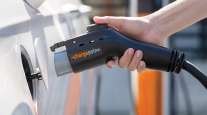Senior Reporter
House Democrats Support Electric Vehicle Policies, Rep. Pallone Says

[Stay on top of transportation news: Get TTNews in your inbox.]
House Democrats are aiming to advance legislation pertaining to electric vehicles as the White House and congressional leaders debate infrastructure policy measures this year.
Electric vehicle technology would lead to environmental improvements and long-term economic benefits, said Rep. Frank Pallone (D-N.J.), chairman of the Energy and Commerce Committee, who expressed support for initiatives that would facilitate the technology’s market access.
Pallone is the sponsor of the Climate Leadership and Environmental Action for Our Nation (CLEAN) Future Act. The legislation aims to realize net-zero greenhouse gas pollution by 2050, with the goal of reducing pollution by 50% from 2005 levels by 2030. The chamber is expected to consider Pallone’s bill and related legislation in the weeks ahead.

Pallone
“Electrifying the transportation sector is critical to meeting our climate goals. This is particularly important since we will be simultaneously working to decarbonize the power sector, which will result in [electric vehicles] becoming even cleaner in the future,” Pallone said during an Energy Subcommittee hearing May 5. “We must invest in the necessary charging and manufacturing infrastructure so that consumers are able to reliably power their cars.”
The chairman added, “Make no mistake, electric vehicles are the future. That’s coming from the auto industry itself. And therefore, we need to do everything we can to ensure America leads that future by making the necessary investments now.”
While most Democrats on the panel echoed the chairman’s viewpoint, senior Republicans pushed back on efforts that would overlook ongoing investments in the country’s energy systems.
“Although the radical left does not like it, America is blessed with a sophisticated, and competitive fuels system, developed over nearly a century to serve our needs,” said committee ranking member Rep. Cathy McMorris Rodgers (R-Wash.). “We should build upon our energy systems, not dismantle them. We should stop attacking the source of American innovation, stop trying to pick winners and losers. We should recognize the essential role technological innovation and American free enterprise serves to address climate risks.”
CLEAN Future Act PDF by Transport Topics on Scribd
“I have real concerns that the CLEAN Future Act puts the cart before the horse by mandating electric vehicles, because there is no consideration for American workers and car buyers, our growing reliance on China for critical minerals to make batteries, and the strain that electric vehicles will place on our grid,” added Rep. Fred Upton (R-Mich.).
As part of President Joe Biden’s American Jobs Plan, $174 billion would be dedicated for investments linked to electric vehicle infrastructure. The president’s plan is meant to pave the way for 500,000 electric vehicle charging stations. According to a summary provided by the White House, “[The plan] will enable automakers to spur domestic supply chains from raw materials to parts, retool factories to compete globally, and support American workers to make batteries and [electric vehicles]. It will give consumers point-of-sale rebates and tax incentives to buy American-made EVs, while ensuring that these vehicles are affordable for all families and manufactured by workers with good jobs.”

Carper
Relatedly, on the other side of the Capitol, Sen. Tom Carper (D-Del.) has expressed support for policies that would facilitate electric vehicles. Carper is the top policymaker on the surface transportation committee.
“The greatest source of emissions, as far as greenhouse gases, is from our mobile sources,” he recently said. “Almost every month, we have announcements from major automakers in the United States and around the world, including Ford and GM regarding their intentions to move away from internal combustion vehicles and into alternative-fueled vehicles.”
Meanwhile, Sens. Gary Peters (D-Mich.) and John Thune (R-S.D.), have emphasized autonomous vehicles have the capability of reshaping the country’s mobility landscape while amplifying access to freight and passenger corridors.
During a hearing of the Surface Transportation, Maritime, Freight and Ports Subcommittee on April 27, Peters said: “One of the most important opportunities we can seize is autonomous vehicle technologies.”
Want more news? Listen to today's daily briefing below or go here for more info:




